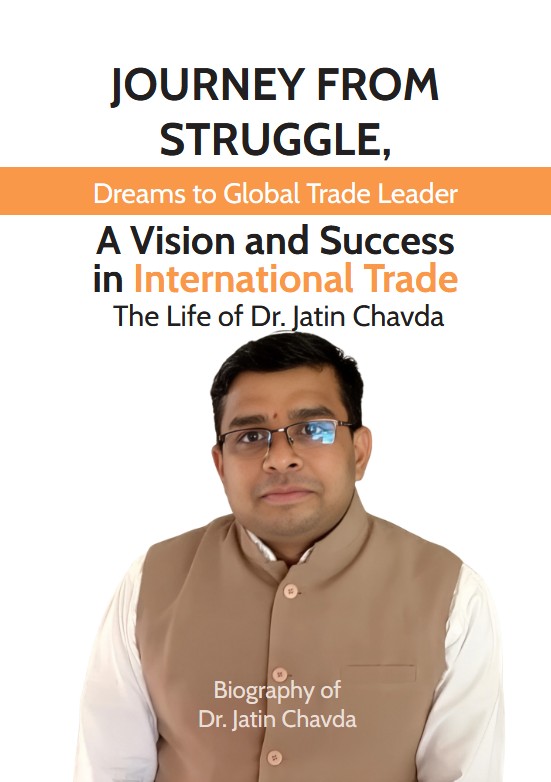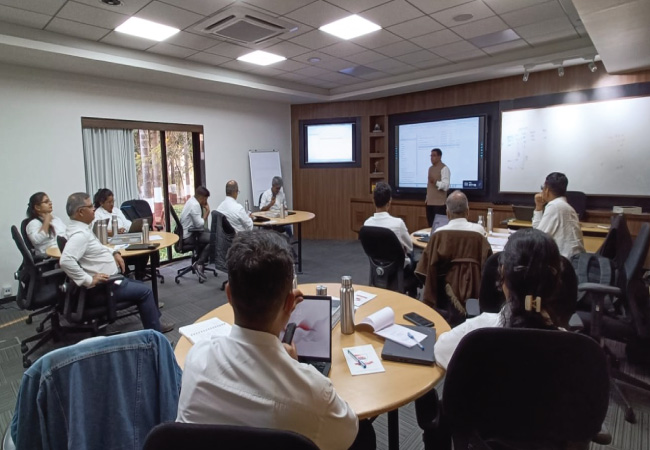

“It is not in the stars to hold our destiny but in ourselves.”
Introduction
In the narrow lanes of Nashik, where dreams often get postponed by responsibilities, and success is weighed against survival, one boy quietly nurtured a wish that seemed almost impossible — to someday earn the title of “Doctor” before his name. That boy was Jatin Chavda, born into a humble, lower-middle-class family, where every rupee had a purpose, and every dream came with a cost. But what he lacked in resources, he compensated with resolve. And what he couldn’t afford with money, he paid for with time, sweat, and sacrifice.
From the outside, Jatin’s story might appear familiar — a determined student working odd jobs to support his studies. But beneath the surface lies a world of silent grit, moments of near defeat, and acts of quiet rebellion against fate. His journey is not just about professional success but about the emotional endurance it takes to rise — not in a sudden leap, but one tired, determined step at a time.
The struggle began early. His father, a furniture businessman, faced a financial crisis in 1993 that threw the entire household into uncertainty. Even paying school fees became a challenge. Yet, through those fragile years of 7th to 9th standard, Jatin held on. He completed his 10th with distinction, fueled not by privilege but by a stubborn faith in education. The dream to become an engineer had to be shelved when even a government college demanded fees the family couldn’t afford. It was a bitter lesson, but also the start of something deeper — the realization that knowledge wasn’t limited to institutions, and that hard work could be a bridge between where you are and where you wish to be.
Shifting from science to commerce wasn’t easy. He entered college with no background in accounts or finance, only to top his class in the very subjects that were once alien to him. The reason? Hunger. Hunger to learn, to grow, to prove to himself and the world that background never defines destiny. During this period, Jatin took on night shifts for daily wages of ₹100, walking 4–5 kilometers to catch the first bus after his shift, brushing his teeth at the factory, and reaching college by 7:30 AM. While his classmates complained of tiredness, he had already worked a full shift and was preparing to learn again.
There were no shortcuts in his life — only detours that demanded courage. Working in an environment where permanent employees offloaded their work onto him, Jatin never retaliated. He took every task — even booking 600-700 bills a night — as a lesson. From data entry to accounts, from costing to compliance, he soaked up every ounce of knowledge. This wasn’t just ambition; it was survival.
At every stage, his choices were rarely glamorous but always purposeful. He turned rejections into redirections. When contract work dried up, he didn’t complain — he used the downtime to learn Microsoft Excel, SAP, and taxation rules. He studied while commuting, while waiting, and while others gave up. His father’s words echoed constantly: “I can’t give you money, but I can give you the hunger to learn. That is your true wealth.”
Phase 1 : The Furnace of Beginnings
“Rock bottom became the solid foundation on which I rebuilt my life.”

In the dim corners of Nashik’s modest chawls, where ambition often gets muffled by the sounds of daily survival, a boy named Jatin Chavda quietly held on to a dream that didn’t quite belong to his circumstances. The kind of dream many might dismiss — not out of cruelty, but from the sheer weight of realism. But Jatin was not built to settle. He wasn’t meant to follow the predictable rhythm of hardship. Instead, he rewrote it, one chapter at a time.
Born into a lower-middle-class family, Jatin’s earliest lessons weren’t taught in classrooms — they were lived. His father, Surendra Chavda, ran a small furniture business. It provided for the family until 1993, when financial turbulence turned their lives upside down. Jatin was in his formative years, grappling with the fragile uncertainty of what comes next. The stability of his childhood was tested, but even in those moments of vulnerability, his family prioritized education. His father, despite the crisis, scraped together the fees. That gesture alone planted something powerful in Jatin — the belief that no matter how tough things get, education is non-negotiable.
He completed his 10th with distinction, a milestone many would applaud. But it wasn’t just a scorecard — it was a declaration. Yet life, in its brutal honesty, reminded him again that dreams demand more than marks. Jatin had always wanted to be an engineer — to build, to invent, to create. But despite securing a first class, the ₹7,000 government college fees and the heavier demands of private institutions made engineering inaccessible. Reservation policies added another invisible barrier. And just like that, his first dream crumbled.
But here’s where the difference lies. Where many would have paused, Jatin pivoted. With silent grace and gritted teeth, he moved from science to commerce — a stream he had no prior exposure to. There was no bridge between the Periodic Table and a balance sheet, but Jatin made one.
The commerce world initially rejected him. Colleges questioned his credibility — after all, what was a science student doing here? But he didn’t plead. He proved. And in his first year, he topped in accounts — the very subject he had never studied before.
During this time, survival and learning danced together in rhythm. By day, he was a student; by night, a contract worker. His first job paid ₹100 a day, of which ₹20 went to the bus fare. The rest was a token for dignity. Working from 9 PM to 6 AM, he handled data entry, inventory, and eventually bill booking. His seniors—full-time employees—often handed off their work to him and slept. Jatin didn’t complain; instead, he booked thousands of bills nightly, organizing files for himself and others. By 6 AM, he brushed at the factory, walked several kilometers, caught a bus, and reached college by 7:30 AM—still in his dusty clothes, notebooks in hand, and mind alert.
Phase 2 : Where Fire Meets Form
“Start where you are. Use what you have. Do what you can.”

By the time Jatin Chavda moved from contract work to a salaried role, he had already endured what many would call too much, too soon. Yet, rather than being burdened, he was shaped by these challenges. What others saw as a grueling cycle of night shifts and college lectures, Jatin embraced as training for endurance. Every document filed, every bill booked, and every sacrificed night was a step toward his personal transformation.
With a monthly income of ₹3,500 and a newfound sense of legitimacy, Jatin began building more than just a career—he built a community. He wasn’t content to succeed alone. At his college, he became an unofficial placement officer, helping classmates, juniors, and peers secure jobs at his workplace. From a lone factory desk, he grew to lead a team of 70 students, all balancing studies and shifts, united by a shared drive for progress.
The contractor who employed them entrusted Jatin with the responsibility of managing attendance—a gesture that spoke volumes about the trust he had earned. This moment marked the start of Jatin’s leadership journey. He led not through authority, but by example. In doing so, he discovered a powerful part of himself—the ability to inspire others without giving orders.
But even as his confidence grew, challenges persisted. Nearing the end of his B.Com, Jatin took a necessary break from his night job to focus on his finals. There was no promise of returning—and indeed, when the exams concluded, the company did not call him back. His reliable, though exhausting, routine disappeared, leaving uncertainty to loom once again.
But uncertainty, for Jatin, was never a roadblock—only a call to pivot. A friend in Mumbai, working at a call center, offered him a chance to step into his role. No interviews, no guarantees—just trust and determination. The day after his final exam, Jatin set off for Mumbai. For three months, he endured a grueling daily commute of over five hours, navigating three trains and four buses, working night shifts, and managing barely 90 minutes of sleep each day. It was unsustainable. His body soon rebelled, and it was his father—ever the steady anchor amid chaos—who urged him to come back home.
The very next day after returning to Nashik, ABB reached out once more. There was an opening—temporary, yes, but in the accounting department. Jatin seized the chance without a second thought. He was back, and this time, it was personal. Having faced rejection, exhaustion, and distance, he was now ready to rise from within.
Phase 3 : Mastery in Motion
“Success is not final, failure is not fatal: it is the courage to continue that counts.”

By 2012, Dr. Jatin Chavda’s path had begun to sharpen — from persistence to purpose, from learning to leadership. His time at Rishabh Instruments had already distinguished him as more than an efficient professional. He was now a problem-solver, an innovator, and a quietly rising leader who didn’t just meet expectations — he redefined them.
After gaining credibility in payables and streamlining salaries for hundreds of employees — a feat that included customizing processes with State Bank of India programmers — Jatin took on a challenge few dared to embrace: costing. Not just financial costing, but deep-diving into the production floor — a space where numbers collided with physical materials, labor, and timelines.
He introduced precise product costing models, mapping the flow of materials, quantifying time spent in each process, and calculating operational load. This level of insight revealed what many had overlooked — that products were sometimes sold at a loss due to unaccounted internal transfer costs. His revelations were eye-opening for the entire management.
Jatin wasn’t working from a distance — he was on the ground, organizing Gemba meetings with shop floor supervisors, understanding machinery cycles, operator frustrations, and overlooked details in daily operations. It wasn’t just about auditing numbers. It was about understanding the soul of the process.
His adaptability and strategic insight earned him a place at the center of a critical financial transformation: the company’s digital evolution. Vendor payments, once dependent on manual cheques, were digitized under his guidance. He introduced automated CSV file uploads, mapped employee accounts for direct salary transfers, and minimized human error. These weren’t minor tweaks — they were organization-wide upgrades that reshaped operations from the ground up.
His leadership didn’t go unnoticed. The trust between Jatin and the company’s top brass deepened to the point where he was selected to represent Rishabh at the Ministry of Finance in Delhi. Tasked with resolving an income tax claim linked to an R&D tax benefit, Jatin spent months in the capital. His efforts resulted in the company securing ₹8 crores in tax savings under the Department of Scientific and Industrial Research — a figure that stunned the leadership and solidified his standing as a trusted financial tactician.